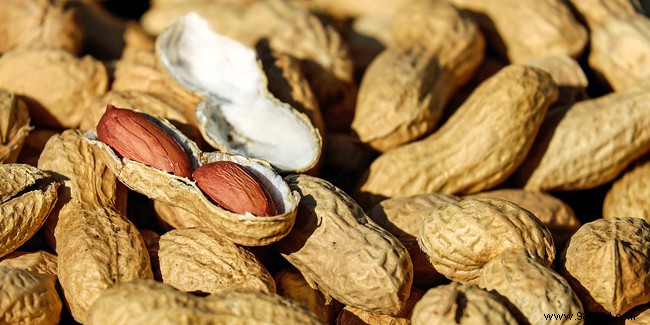
Peanuts, also called groundnuts, always have a very bad reputation, because they are supposed to contain a lot of calories and make us fat if we eat too much of them. Often served as an aperitif, they go unnoticed and are consumed in a few minutes. But what is it really? peanuts do not deserve this received idea, because they are also excellent for health and have many medicinal properties. Here are the main ones.
Peanuts are an excellent source of vegetable protein (which is not as complete as animal protein, however). They are rich in:
Peanuts are very rich in zinc when roasted in oil, which strongly contributes to immune reactions. It thus helps to heal wounds and the development of the fetus. It also helps release insulin, as it participates in its creation in the pancreas.
Peanuts also contain a lot of copper which is necessary for the formation of collagen and hemoglobin. Copper also helps the body defend itself against free radicals.
The peanut contains manganese in good quantity. This element helps prevent damage caused by free radicals in the body.
Vitamin B3 is also called niacin. It helps produce energy from the proteins, carbohydrates and fats we absorb. This same vitamin also contributes to the formation of DNA and normal growth in children.
When the peanut is dry roasted, it is an excellent source of magnesium for bone development, muscles, dental health, the immune system and the nervous system.
The phosphorus contained in the peanut is the second mineral in the body after calcium. It is necessary for the health of the teeth and the formation of the bones as well as for the regeneration of all the tissues of the human body.
Potassium is in greatest presence in the dry roasted peanut. It balances the pH of the blood and helps promote digestion. It contributes to the proper functioning of the heart and nerve impulses.
Vitamin E is a very good antioxidant that protects the membrane of all cells in the human body.
The iron in peanuts helps carry oxygen in the blood. It also contributes to the formation of red blood cells, new cells, neurotransmitters and hormones.
Vitamin B1 is also called thiamin. It contributes to the production of energy of the body from the ingested carbohydrate and also participates in the growth of the child.
Selenium is also found in dry roasted peanuts. It is an antioxidant that prevents the formation of free radicals.
The folate or vitamin B9 contained in the peanut helps in the formation of red blood cells. It also plays a big role in the nervous system, the immune system and in healing wounds.
The vitamin B6 contained in the peanut contributes to the synthesis of neurotransmitters. Also called pyridoxine, this vitamin is still necessary for the transformation of glucose and the formation of nerve cells.
Peanuts are a good source of dietary fiber. They thus prevent the risk of colon cancer, cardiovascular disease and control diabetes TII.
Thanks to all the elements it contains, the peanut is a good ally for your health provided you do not abuse it too much, because it is also extremely rich in calories. Peanuts are a good cardiovascular protector, because eating them regularly helps lower cholesterol levels.
A study conducted shows that two servings of peanuts per week helps reduce colon cancer in women. Further scientific studies should be conducted to further analyze peanut compounds and cancer prevention.
A large epidemiological scientific study shows that five spoonfuls of peanut butter per week would help reduce the risk of diabetes IID in women thanks to the dietary fiber and magnesium contained in peanuts.
Several scientific studies still show that peanuts consumed regularly prevent the risk of gallstones in women thanks to magnesium, phytosterols and dietary fiber.
Dry roasted peanuts are the most interesting to help maintain health, but at the same time, they are fried in oil, higher in sodium and therefore contain more calories than others. It is therefore advisable not to eat more than 30 grams per day if you are not overweight or obese. Peanuts are a perfect food for the morning snack.
There are contraindications to the absorption of peanut, as it is one of the main known allergens. Peanuts can create very serious allergies up to anaphylactic shock. As it contains oxalates, the peanut is also contraindicated in case of disposition to the formation of gallstones and urinary stones. If the peanut is a little spotted with black, is rancid or moldy, it should not be eaten, as it may be a toxin that is dangerous to your health.